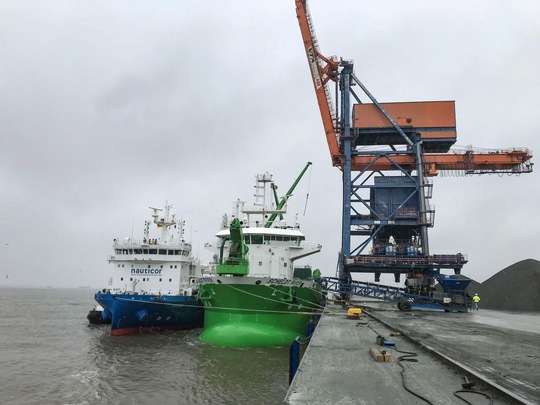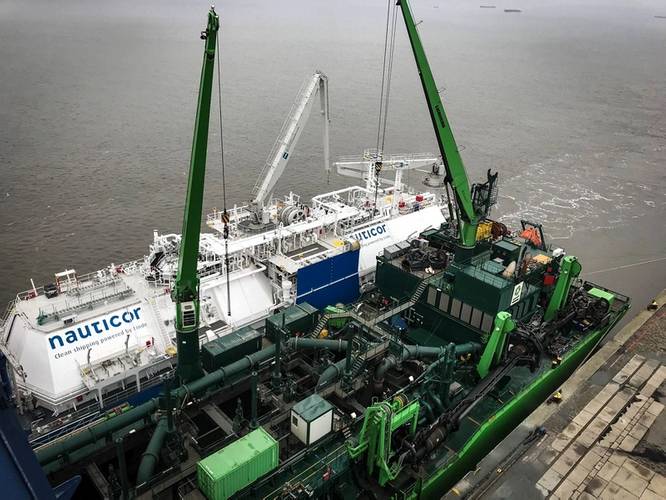Ship-to-Ship LNG Bunkering Ops Commence in Germany
Another milestone for the establishment of LNG (Liquefied Natural Gas) as marine fuel in Germany has been achieved. Nauticor successfully conducted the first ship-to-ship LNG bunkering operation in a German port. The trailing suction hopper dredger (TSHD) Scheldt River received the low emission fuel from the bunker supply vessel (BSV) Kairos.
Today, the world’s largest LNG BSV Kairos conducted the first ship-to-ship bunkering operation in German waters. The vessel, which was christened in Hamburg on February 2019, is owned by Babcock Schulte Energy and is operated on behalf of the German LNG supplier Nauticor. In total, the TSHD Scheldt River received 300 cbm of LNG at the Elbehafen Brunsbüttel, part of Brunsbüttel Ports GmbH. Scheldt River is owned and operated by the DEME Group and is currently conducting maintenance dredging works on the Lower Elbe. In the past, the vessel has received LNG from Nauticor through truck-to-ship bunkering operations. In the beginning of October 2019, the DEME Group and Nauticor signed a framework agreement for the supply of LNG with the BSV Kairos to DEME’s fleet of newbuild vessels with LNG propulsion. The first ship-to-ship LNG bunkering operation in a German port marks the start for an extended cooperation.
By using LNG, a wide range of emissions, especially sulphur, nitrogen and particle matters, as well as carbon dioxide, can be significantly reduced. Therefore, LNG is seen as more environmentally-friendly in comparison to traditional oil-based marine fuels.
The possibility to supply LNG through a ship-to-ship bunkering operation marks an important milestone for the shipping sector in Germany in general. By using larger BSVs, it becomes practical both economically and ecologically to supply larger vessels with significant amounts of LNG. Previous LNG bunkering operations in Germany were conducted solely through the truck-to-ship method.
Frank Schnabel, Managing Director Brunsbüttel Ports GmbH / SCHRAMM group, said: "The first LNG ship-to-ship bunkering operation in the Elbehafen is a confirmation of our activities to establish Brunsbüttel as the leading LNG hub in Germany. The port and industrial location Brunsbüttel fulfills all necessary requirements for LNG related activities including use, handling, storage, and bunkering operations. After having several truck-to-ship LNG bunkering operations on our premises, we have now been able to prove that ship-to-ship bunkering operations are possible in our port as well. All legal and operational prerequisities are in place as a result of the fruitful cooperation with the experts from Nauticor, Brunsbüttel Ports, and the Agency for Coastal Defense, National Parks and Marine Conservation for Schleswig-Holstein (LKN) as the responsible administrative authority.
In the meantime, the German LNG Terminal GmbH continues to plan activities for a combined LNG import and distribution terminal in Brunsbüttel. In the future, the supply of LNG to marine customers would profit from the existence of such a terminal, since it is foreseen that LNG bunker supply vessels, such as Kairos, can load LNG as cargo directly at the terminal.

















